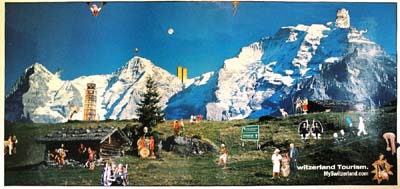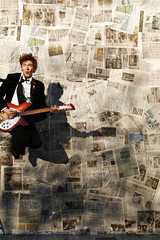The decline in Swiss trade with the United States continued in 2003 and has become an “unsatisfying trend”, according to the Swiss-American Chamber of Commerce.
Officials warn that no upturn can be expected for at least the next 18 months. At its annual press conference in Zurich on Monday, the chamber reported that Switzerland’s trade surplus with the US was at an all-time high, reaching a record SFr8.4 billion ($6.56 billion) in 2003.
Swiss exports to the US declined by 3.3 per cent last year to SFr13.8 billion. While the total value of Swiss imports worldwide was virtually unchanged in 2003 at SFr122.4 billion, imports from the US fell by 17.3 per cent to SFr5.4 billion.
The chamber said the decline could partly be explained by the fact that Swiss consumers were turning away from US products in protest against some of the Bush administration’s policies.
Imports of wine fell by nine per cent in 2003, while the number of cars imported from the US declined by seven per cent. Both are what US officials call “emotional” consumer products.
“American products in favour a few years ago are currently out of favour and these are products which follow the daily political volatility rather than the very strong underlying business relationship,” the chamber’s new chief executive officer, Martin Naville, told swissinfo.
The chamber said another reason for the decline in imports was that the US had recovered much faster than Europe after the global economic slowdown of 2000 and 2001. It added that the economic impact of the war in Iraq was less pronounced in the US than it was in Europe.
Tourism has also been hit hard over the past few years. The number of Swiss choosing to visit the US on holiday has fallen by 42 per cent since 2000. “Unfortunately, given the current visa and security [regulations], we don’t see this changing very fast,” said Naville.
“It is really up to us to provide a lot of information and transparency to persuade people to travel much more [than they are doing now] from Switzerland to the US and in the other direction,” he added.
The business relationship between Switzerland and the US is [still] very healthy,” said Naville. “Trade has retracted due to a weak dollar, which makes Swiss products in the US very expensive. But it's also due to weak demand in Switzerland, which has [found it difficult] to get out of recession over the last few years,” he added.
On a more positive note, the chamber noted that investment showed some resistance to political concerns. Swiss direct investment in the US last year totalled around $112 billion, making Switzerland the sixth-largest investor in the country.
US investment in Switzerland jumped by 21 per cent in 2003 to $86 billion.
Copyright: swissinfo, Robert Brookes in Zurich


